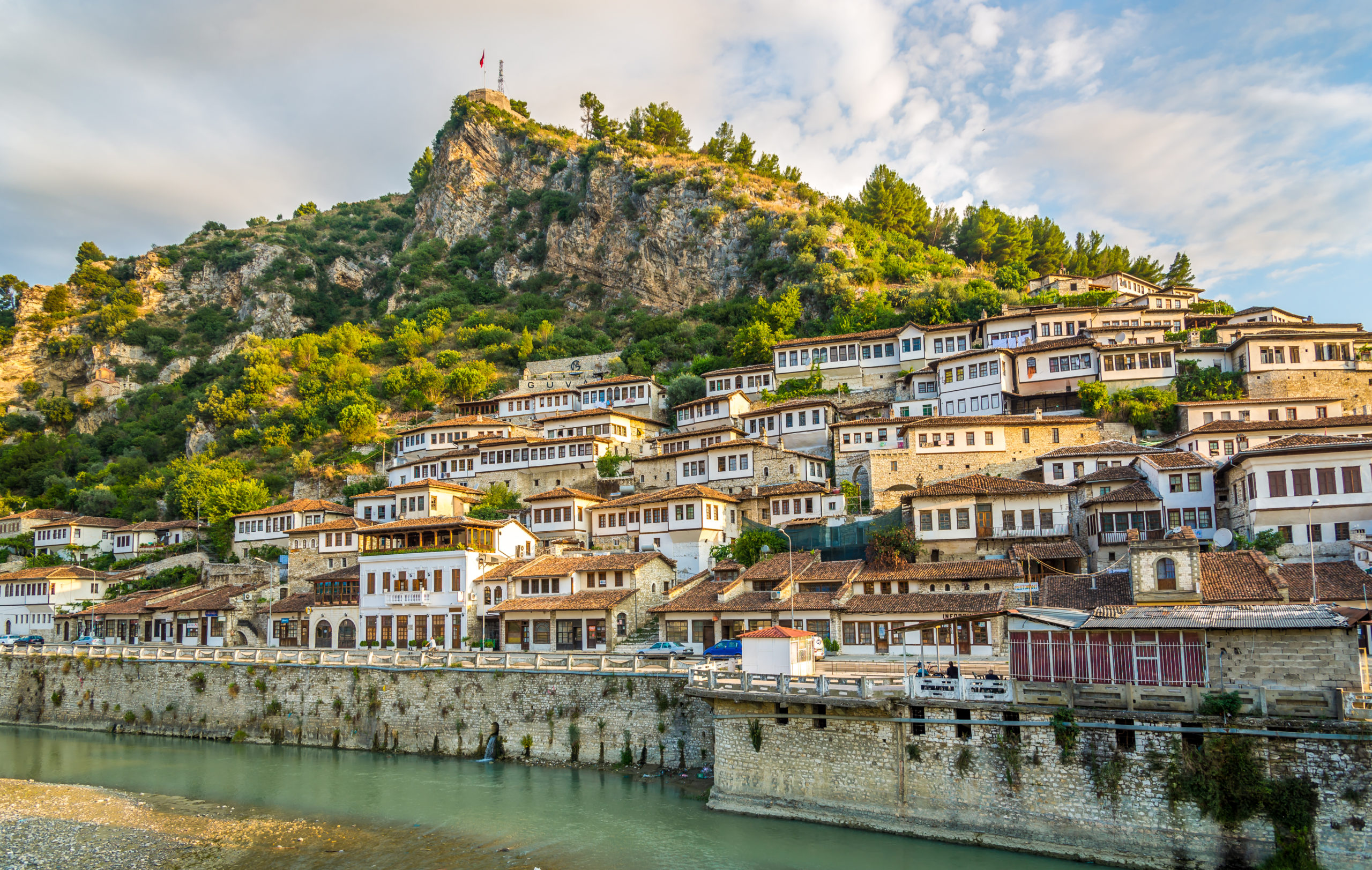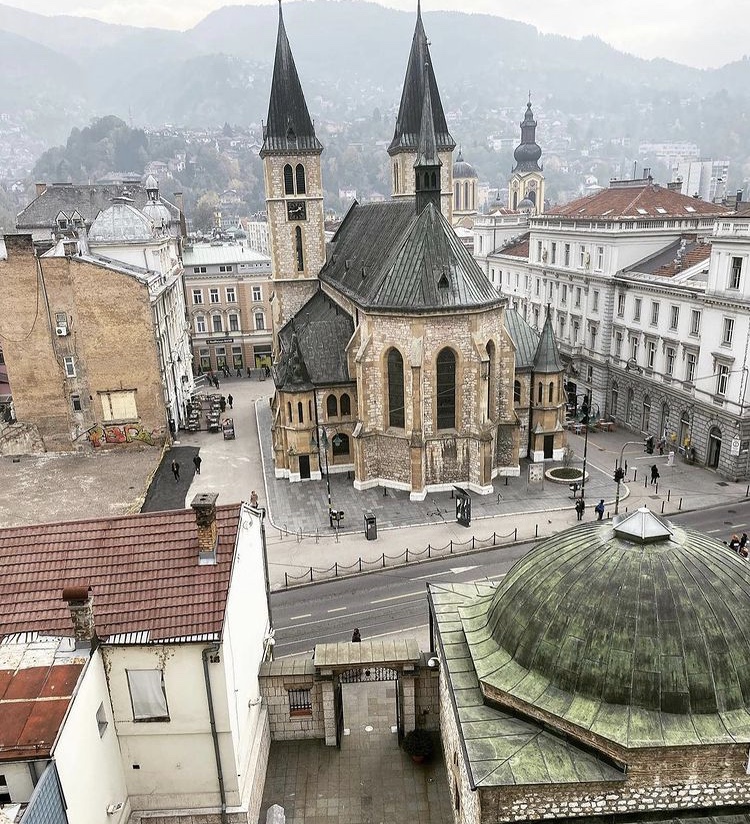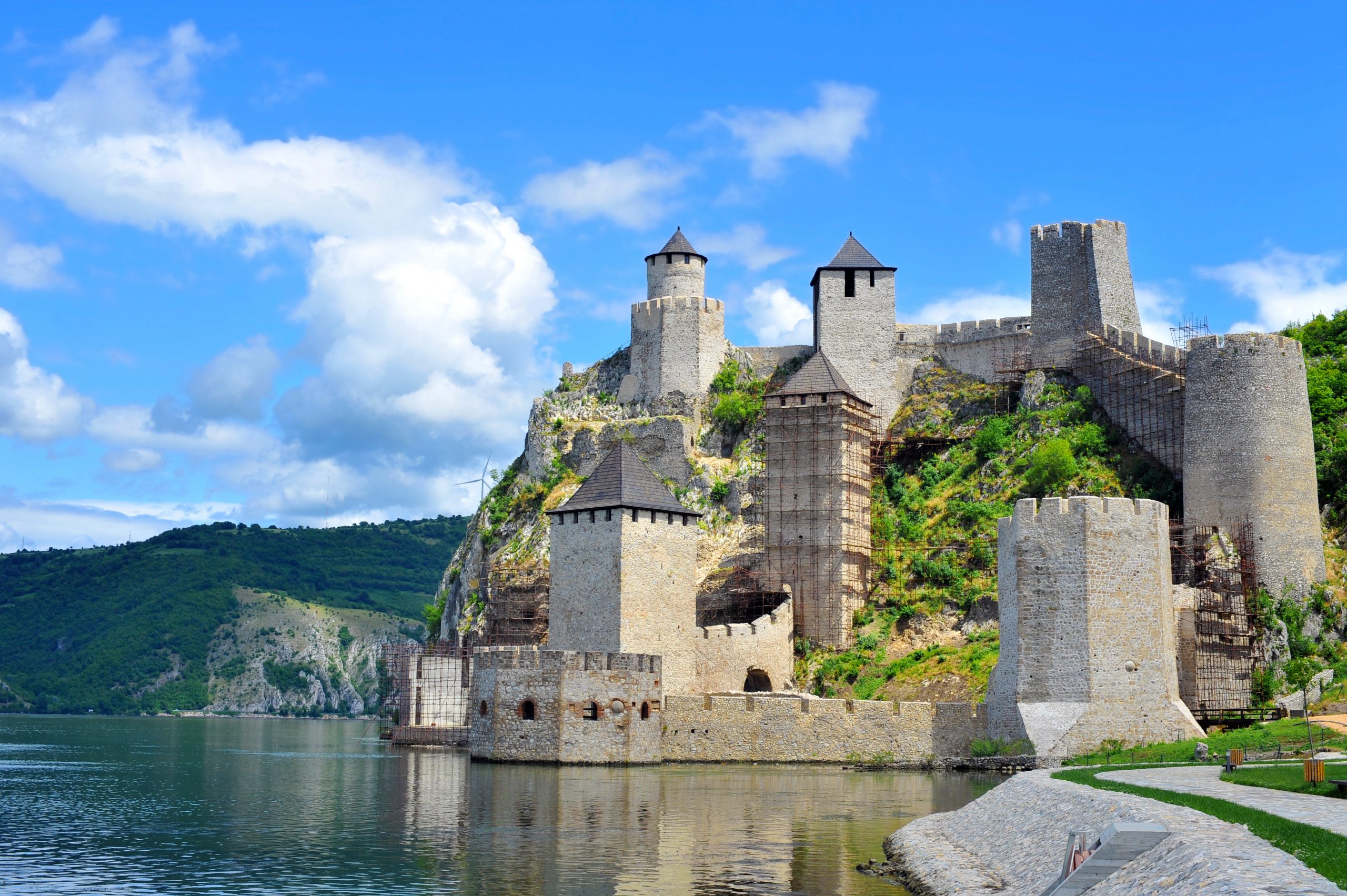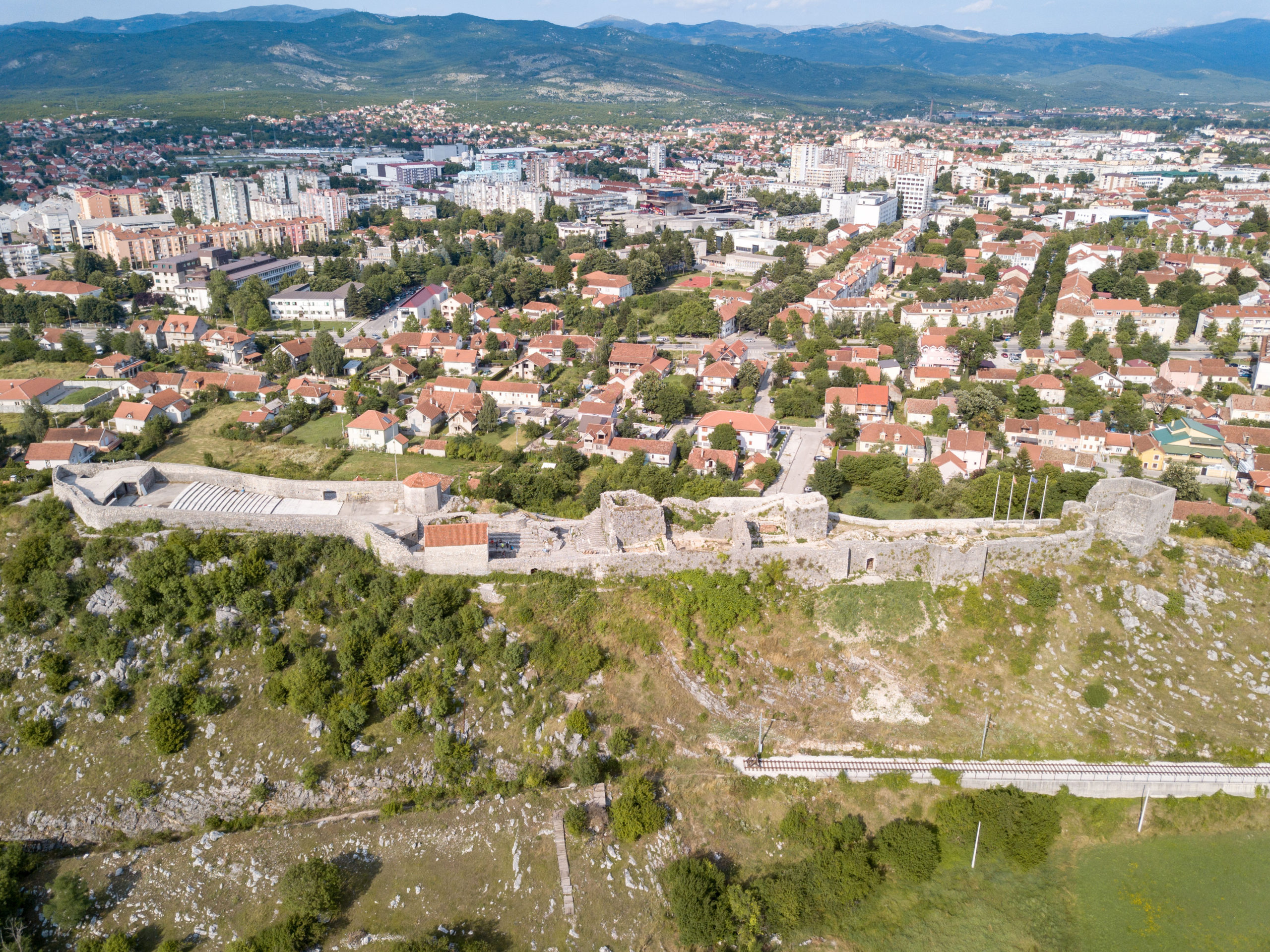Strategic Analysis Balkan Brief
Monthly review of September and October 2022
Petra Bošková, Ivan Iliev, Jakub Kužel

Old City Berat, Albania. Photo: Milosk50/Shutterstock
Albania
Massive cyber-attack by Iran: Breaking diplomatic ties
On September 10, Albania officially severed diplomatic relations with Iran after accusing it of a major cyberattack on a government website. Albania’s PM, Edi Rama, announced that an „immediate notification“ had been sent to the Iranian embassy staff to leave the country within 24 hours. The cyber-attack from September is the second attack on the Albanian government’s website this year.
A group called „Homeland Justice“ initially claimed responsibility for the attack. However, the investigation found that the incident was an act of „state aggression“ and was not carried out by individuals or independent groups. The Iranian government has denied any involvement.
The „broad and complex“ attack began as ransomware when hackers attempted to hit critical systems and render them inoperable. However, the Albanian government’s website was restored soon after the incident. Tirana said it cooperates with Microsoft and the FBI to investigate the cyberattack.
Albania has expelled four Iranian diplomats in the past – specifically in 2018 – for allegedly „endangering national security.“ On October 3, the Iranian hacking group „Homeland Justice“ released new information regarding people who are allegedly „under suspicion“ by Albanian police authorities. The file, titled „Suspects,“ contains information allegedly related to people in the National Police database who are linked to various crimes.
An FBI investigation suggested that the Iranian group gained initial access to the network about 14 months before the first cyberattack was launched, which took place in July 2022. As a result, the US National Security Council will take further action to hold Iran accountable for acts that threaten security and set a troubling precedent for cyberspace.
Sources:
- EuroNews, „Albania breaks diplomatic ties with Iran over major cyberattack“, https://www.euronews.com/2022/09/07/albania-breaks-diplomatic-ties-with-iran-over-major-cyberattack
- Sinoruka Fjori, Balkan Insight, „Iranian Hackers Leak Database of Albanian Criminal Suspects„, https://balkaninsight.com/2022/10/03/iranian-hackers-leak-database-of-albanian-criminal-suspects
- Sinoruka Fjori, Balkan Insight, „Iranian Hackers Leak Database of Albanian Criminal Suspects„, https://balkaninsight.com/2022/10/03/iranian-hackers-leak-database-of-albanian-criminal-suspects/

Sarajevo, Bosnia and Herzegovina
Bosnia and Herzegovina
Opposition calls for recount of votes in Bosnia and Herzegovina
On October 2, general elections took place in Bosnia and Herzegovina. Despite the fact leading ethnic parties were sure about their electoral success before the elections, the polls have proved that their position is decreasing and they are losing popularity.
After the count of all the votes Denis Becirević, a candidate of the Bosniak opposition parties, defeated the SDA candidate Bakir Izetbegović. Becirević received 57,29% of votes, while Izetbegović only 37,48%.
In the Serbian electorate, Željka Cvijanović, from the leading Bosnian Serb party, the Alliance of Independent Social Democrats (SNSD), has defeated (52,57% of votes) Bosnian Serb opposition leader Mirko Šarović (36,04%) and has become the next president of Bosnia’s Serb-dominated entity, Republika Srpska, a representative in the Trio Presidency.
Also, Željko Komsić, from the Democratic Front, who got 54,59% of votes, defeated Borjana Krišto (45,41%) from the Croat Democratic Union, HDZ, in the race for the Croat presidency post.
Interestingly, SNSD boss Milorad Dodik defeated the opposition candidate Jelena Trivić from the Party of Democratic Progress, PDP. According to the results, Milorad Dodik from the Alliance of Independent Social Democrats (SNSD) won about 281,000 votes, while Trivić got around 252,000 – around 30,000 fewer.
However, Jelena Trivić and her political party have accused Dodik of electoral fraud, calling for a recount of votes. Trivić has claimed that a slow process of counting votes, combined with electoral fraud claims, raises questions about the fairness of elections. In particular, the Party of Democratic Progress (PDP), the Serbian Democratic Party (SDS), and the List for Justice and Order are demanding a recount of the votes for president due to the reports of election irregularities. As a reaction to the alleged electoral fraud, On October 9, thousands of supporters of the opposition in Republika Srpska marched in the streets to protest the results of a recent presidential election, alleging fraud and demanding a recount.
In addition to elections‘ integrity doubts, the controversy was sparked by the head of the Office of the High Representative, Christian Schmidt. An hour after the polling stations were closed, Schmidt imposed changes to the election laws. In particular, „the changes to the Federation entity constitution include increasing the size of the Federation’s House of Peoples chamber from 58 to 80 and increasing the caucuses of each of the three main ethnic groups – Bosniak, Croat and Serb – from 17 to 23“. According to his decision, the new entity-level House of Peoples will now comprise 23 Bosniaks, Serbs and Croats each, along with 11 Others. Moreover, the increase in seats allows „Others“ to select a representative from each canton, which was not the case earlier.
Sources:
- Latal Srečko, „Bosnia Elections: One Loser, no Clear Winners – Uncertain Prospects „, https://balkaninsight.com/2022/10/04/bosnia-elections-one-loser-no-clear-winners-uncertain-prospects/
- Radio Free Europe, „Opposition Returns To The Streets In Bosnia’s Serbian Entity, Claiming Election Fraud By Dodik“, https://www.rferl.org/a/bosnia-election-opposition-protests-dodik-trivic/32072323.html
Croatia
Census: minorities in Croatia are declining and need stronger legal protection
The end of September 2022 brought the publication of the long-awaited census data in Croatia. The census found that in the last ten years, Croatia has lost almost ten per cent of its population, mainly due to emigration to other EU countries in search of work.
However, the survey also showed that the proportion of citizens with an ethnic identity other than Croatian had dropped significantly, which has caused political changes in many localities. Since the declaration of its independence and international recognition in 1992, Croatia has had special rules regarding the rights of traditional minority ethnic groups, mainly Serbs, Italians, Czechs, Hungarians, Roma, and others. These rules were preconditions for international recognition of Croatia’s independence and, much later, for its membership in the EU. Moreover, many of these rights are legally linked to the population census results carried out every ten years.
An example is the multi-ethnic city of Vukovar. Legislation on minority rights stipulates that a city or municipality will be officially multilingual if a particular minority makes up at least one-third of its population. The last census in 2011 showed that ethnic Serbs make up approximately 35% of Vukovar’s population. In 2013, the national government attempted to introduce bilingual signage in Serbian and Cyrillic, as well as Croatian and Latin, in public institutions. However, this was met with violent protests, mainly led by Ivan Penava, then a political novice but now mayor of Vukovar and leader of the far-right political party Movement for Homeland.
The current legislation does not prohibit multilingualism if the minority does not count for one-third of the population. Furthermore, the most recent Council of Europe resolution on implementing the Framework Convention for the Protection of National Minorities clearly states that the current legal minimum for bilingualism in Croatia is too high. In the case of Croatia, the existing legal mechanisms for the protection of minorities, which are only partially complied with, have proven to be insufficient. Therefore, there seems to be a great need for much more attention to ethnic, cultural, and political pluralism in the country.
Sources:
- Vukobratović Nikola, Balkan Insight, „Croatia Ethnic Homogenisation Continues as Serb Minority Dwindles „, https://balkaninsight.com/2022/09/28/croatias-ethnic-homogenisation-continues-as-serb-minority-dwindles/
Kosovo
Kosovo will establish Agency for Cyber-Security
On September 14, in response to the wave of attacks on the cyber infrastructure of Kosovo Telecom, governmental websites and even other Western Balkan countries in the previous months, authorities in Prishtina decided to propose the establishment of an Agency for Cyber-Security.
Kosovo Minister of Interior, Xhelal Sveçla, explained this move: „we have recently faced cyber-attacks. Through this law, a legal basis for the prevention of cybercrime will be created in this direction. Regulation of the cyber field is also related to the government’s program“.
The law should strengthen IT security in Kosovo and make establishing the State Authority for Cyber-Security legally achievable. Also, the law will set a contact point in the Kosovo Police that will serve to receive warnings about possible hybrid and cyber threats in Kosovo.
The latest attack forced Kosovo authorities to react immediately and hire external experts to prevent other attempts to harm Kosovo’s telecommunication and IT infrastructure. The latest cyber attacks on the infrastructure of Kosovo Telecom and some governmental institutions caused the interruption of internet services on mobile and landline phones and made government websites inaccessible.
Also, other countries in the region faced similar cyber-attacks this year. For example, Albania, North Macedonia and Montenegro were the targets recently. In Albania, the incident caused the freezing of diplomatic ties with Iran. Prime Minister Edi Rama said, „a deep investigation brought incontestable proof that the cyber aggression towards our country was orchestrated and sponsored by the Islamic Republic of Iran, which engaged four groups for the attack“.
The government and judiciary were offline in Montenegro due to the attacks on August 24. In North Macedonia, state institutions were forced to increase their IT security after the hackers took down the Ministry of Education website.
Sources:
- Vllahiu Emirjeta, „NEWS Kosovo to Establish Agency for Cyber Security Amid Recent Attacks „, https://balkaninsight.com/2022/09/14/kosovo-to-establish-agency-for-cyber-security-amid-recent-attacks/

Golubac, Serbia. Photo: PavleMarjanovic/Shutterstock
North Macedonia
The opposition in North Macedonia blocks the „Open Balkan „initiative
The „Open Balkan“ initiative is currently the most discussed topic in the North Macedonian parliament. At the end of September, the opposition, led by the VMRO DPMNE party, complicated the coalition’s adoption of several laws under the „Open Balkan“ initiative.
The main question is whether this agreement brings as many advantages as the current coalition presents. The essence of the initiative is to facilitate the movement of goods and people across the border between the three participating states, namely Serbia, North Macedonia, and Albania.
For North Macedonia, this agreement would probably become a burden that could question its entry into the European Union. At first glance, the opposition, by not approving several laws, is trying to prevent mistakes for the country’s future direction. However, the chairman of the opposition party VMRO DPMNE, Hristijan Mičkoski, is beginning to contradict his statements from November last year. In November, he said, „Open Balkan is a good opportunity for deeper cooperation“. But now he has a different opinion and expects an explanation from the coalition as to why this initiative should be helpful for North Macedonia.
One of the discussed topics about the freer movement of goods and people is concrete data on what impact the opening of the borders will have on the inflow or outflow of labour in North Macedonia. However, it can be estimated now that the situation regarding the adoption of the „Open Balkan“ initiative will reach the point where the opposition will also accept it. Considering the contradicting statements of the chairman of VMRO DPMNE, it can be assumed that it is only a political move to question the coalition’s actions.
Open Balkan’s benefits have been questioned for a long time, and its effects are even more significant from the economic point of view, where Serbia can probably benefit the most. Also, this initiative is rejected by Kosovo and Bosnia and Herzegovina, which do not want to compromise their efforts to join the European Union. Montenegro has not yet committed to anything, but the outgoing Prime Minister Abazović is lobbying to join the initiative. The problematic actor is Serbia, which does not have a clear position towards the EU and refuses to cooperate in imposing sanctions on Russia after it attacks Ukraine.
Sources:
- Edward P. Joseph, Balkan Insight, „Open Balkan(s) is Not Just Unwise. It’s Dangerous„, https://balkaninsight.com/2022/06/15/open-balkans-is-not-just-unwise-its-dangerous/
- Euractiv, „North Macedonia opposition blocks adoption of Open Balkan laws„, https://www.euractiv.com/section/all/short_news/north-macedonia-opposition-blocks-adoption-of-open-balkan-laws/
- Sinisa Jakov Marusic, Balkan Insight, „North Macedonia Opposition Stalls‘ Open Balkan‘ Free Flow of Workers„, https://balkaninsight.com/2022/09/29/north-macedonia-opposition-stalls-open-balkan-free-flow-of-workers/
Serbia
Serbia will not recognize the referendum in occupied Ukrainian territory
On September 26, Serbian Foreign Affairs Minister Selaković announced that Serbia would not recognize the referendums held by Russia in Ukrainian-occupied regions, as they violated Serbian policy of respecting territorial integrity and sovereignty, considering the situation with Kosovo.
Selaković added, „In accordance with the Charter of the United Nations, but also in accordance with the generally accepted principles and norms of public international law, [Serbia] cannot accept the results of the referendum in the Ukrainian regions“. Regarding the Serbian issues with Kosovo, Selaković stated that referendums held by Russia in occupied Ukrainian territories are: „completely contrary to our state and national interests, it would be contrary to our policy of preserving territorial integrity and sovereignty and commitment to the principle of inviolability of borders“.
Even though Serbia has not recognized the Russian-held referendums in four occupied areas of Luhansk, Donetsk, Kherson and Zaporizhzhia, it is continually aligning its foreign policy with Kremlin. It is proven by the fact that Ministers of Foreign Affairs of Serbia and Russia, Nikola Selaković and Sergei Lavrov, recently signed a Plan of Consultations for 2023-2024, which promises to consult Serbian foreign policy with Russia.
The step caused criticism from the European Parliament and western partners. They argued that in the time of Russian aggression in Ukraine, as a country that claims to seek European Union membership, Serbia should not boost its cooperation with Moscow. Despite Selakovć’s claims that the agreement does not have anything to do with Serbian aspiration for EU membership, it proves that Belgrade is not eager to ease ties with Russia, which has gained significance in Serbia over the previous few years.
Sources:
- Stojanović Milica, „Serbia Rules Out Recognizing Russian Referendum in Occupied Ukraine „, https://balkaninsight.com/2022/09/26/serbia-rules-out-recognizing-russian-referendum-in-occupied-ukraine/

Bedem fortress in Niksić, Montenegro. Photo:Uros Stepisnik/Shutterstock
Montenegro
Suspected Russian spying
On September 30, media reported that police had already detained six Russian diplomats, thirty Russians with temporary residence permits, and two Montenegrins on suspicion of working for Russian intelligence. In addition, outgoing PM Dritan Abazović said that the state prosecutor’s office had opened an investigation into an unspecified number of people accused of espionage and forming a criminal organization.
The PM confirmed that the action is international, with Western partners assisting. He stated he was „ready to protect Montenegro’s national interests.“ However, the Special Prosecutor’s Office, which is in charge of the whole investigation, said that the police was only searching the premises; for the time being, they have not officially arrested anyone yet.
Abazović told Fox News in mid-September that Montenegro is under negative political and economic pressure from Russia and China, stressing that the US should counter this influence in the Western Balkan countries.
Russia and Montenegro have strong historical ties, but their mutual relations have cooled in the face of numerous incidents that have undermined their partnership. In 2014, when Montenegro was seeking NATO membership, it joined previous sanctions imposed by the EU and the US on Russia over its annexation of Crimea and involvement in the fighting in eastern Ukraine.
Relations further soured in 2016 when Montenegro accused Russia of attempting a coup to prevent it from joining NATO. Three years later, Russia was accused of massive cyberattacks on a government server that forced the public administration to work offline for more than a month.
Currently, the country is polarized regarding the perception of Russia and their invasion of Ukraine, as Montenegro has a large Serbian population traditionally sympathetic to Russia.
Sources:
- Kajoševič Samir, Balkan Insight, „Montenegro Launches Probe Into Suspected Russian Spies „, https://balkaninsight.com/2022/09/29/montenegro-launches-probe-into-suspected-russian-spies/
- Kajoševič Samir, Balkan Insight, „Pandemic Delays Final Verdict in Montenegro „Coup „Case „, https://balkaninsight.com/2020/05/08/pandemic-delays-final-verdict-in-montenegro-coup-case/

Contact us